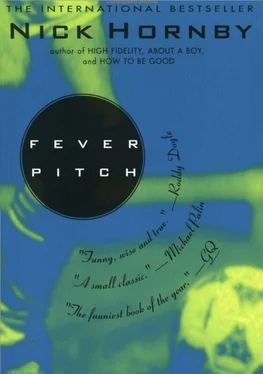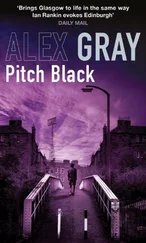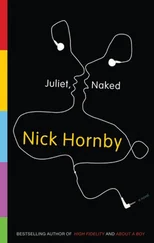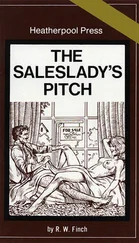But there’s even more to it than all that. During matches like the Everton semi-final, although nights like that are inevitably rare, there is this powerful sensation of being exactly in the right place at the right time; when I am at Highbury on a big night, or, of course, Wembley on an even bigger afternoon, I feel as though I am at the centre of the whole world. When else does this happen in life? Maybe you’ve got a hot ticket for the first night of an Andrew Lloyd Webber show, but you know that the show is going to run for years and years, so you’d actually have to tell people afterwards that you saw it before they did, which is kind of uncool and in any case completely ruins the effect. Or maybe you saw the Stones at Wembley, but then even something like that is repeated for night after night nowadays, and consequently doesn’t have the same one-off impact of a football match. It’s not news , in the same way that an Arsenal v Everton semi-final is news: when you look at your newspaper the next day, whichever one you read, there will be extensive space given over to an account of your evening, the evening to which you contributed simply by turning up and shouting.
You just can’t find this outside a football ground; there is nowhere else you can be in the entire country that will make you feel as though you are at the heart of things. Because whichever nightclub you go to, or play, or film, or whichever concert you see, or restaurant you eat at, life will have been going on elsewhere in your absence, as it always does; but when I am at Highbury for games like these, I feel that the rest of the world has stopped and is gathered outside the gates, waiting to hear the final score.
ENGLAND v HOLLAND
March 1988
In 1988 I began working for a Far Eastern trading company. I started out as a teacher, but it soon became clear that my middle-management pupils were more perplexed by the bizarre requests they received from their head office than they were by the English language. So the teaching vanished, and instead I did what I can only describe as Other Things, since a generic description of my duties is beyond me. I wrote countless letters to solicitors, and a long essay on Jonathan Swift which was translated and faxed back to base; I ascertained to my employers’ satisfaction what constituted drinking water; I pored over the landscape plans for Hampton Court and took photographs of Beaulieu Motor Museum; I went to see Directors of Social Services to talk about orphanages; I became involved in protracted negotiations for equestrian centres in Warwickshire and pedigree dogs in Scotland. It was varied work.
The managers worked astonishingly hard: their contracted hours were from 8 a.m. to 8 p.m. on Monday to Friday, and from 8 a.m. to 2 p.m. on Saturday, but these were nominal—a twelve-hour day, like Gordon Gekko’s lunch, was for wimps. But when I told three of my students that Gullit and Van Basten were coming to town to pit their wits against Lineker and Shilton, the temptation was too much even for them, and I was instructed to buy tickets and act as their chaperon and inductor for the evening.
Every couple of years I forget what a miserable experience it is to go to Wembley to watch England play, and give it another try. In ’85 I went to watch a World Cup qualifier a couple of weeks after Scotland’s Jock Stein had died, and listened to the most mind-bogglingly obscene celebratory songs; four years later I went to another one, and sat among people who gave drunken Nazi salutes during the National Anthem. Why I thought that things would be any different for a friendly against Holland I can’t remember, but it turned out to be an embarrassing misapprehension.
Our timing was just right. We were walking down Wembley Way about fifteen minutes before kick-off, with reserved seats in our pockets, and I was feeling pleased with my expert organisation. As we approached our entrance, however, we were met by a determined and indiscriminate mounted police charge, and we were forced back down the road with hundreds of other ticket holders, and my colleagues began to panic. We regrouped and started again; this time our £12.00 tickets were regarded, reluctantly, as certificates of legitimate interest, and we were allowed to approach the stadium. As we did so, the game kicked off and England scored almost immediately, but we missed all that—we were still negotiating admission. One of the entrance doors was hanging off its hinges, and an official told us that large numbers of people had forced their way into the ground.
Once inside, it was obvious that our seats had gone. The gangways were packed with people like us, all clutching now-worthless ticket stubs, all too afraid to confront the crop-headed, thick-necked people sitting in our seats. There wasn’t a steward in sight. “Here come the fucking Wongs”, remarked one of a group of young men, as I led my charges down the steps to find a position from which we could see at least a square of the pitch. I didn’t bother translating. We stood and watched for about half an hour, during which time Holland took a 2-1 lead; the dreadlocked Gullit, the main reason why the game had sold out in the first place, provoked monkey noises every time he touched the ball. Just before half-time we gave up and went home. I got back to my flat just in time to watch the highlights on TV.
People have told me that they’re beginning to turn things round at Wembley now, and post-Italia ’90, what with Gazzamania and Lineker charm, the composition of the average England crowd is changing. This often happens when a team is doing well, and in itself it doesn’t offer much cause for hope, because when they play badly again you lose that lot. It seems to me, and this is not a theory that I can support with any hard evidence, but never mind, that bad teams attract an ugly following.
Only boneheads entertain serious doubts nowadays about the link between social and economic conditions and football violence, but why is it that, say, Birmingham City fans have a markedly worse reputation than Sunderland fans? Even if we accept, for the sake of argument, that the West Midlands suffers from the same kind of social and economic deprivation that plagues the North-East, then how does one explain the impeccable behaviour of the Villa supporters? Two teams from the same city; but one plays in the First Division, and the other languishes in the Third. When Leeds, Chelsea and Manchester United were in the Second Division their fans terrified everybody; when Millwall came up to the First their reputation for monstrous, evil violence evaporated a little. And I don’t think that poor football actually changes the way people behave; it’s not that, although there is an element of compensatory pride involved (“We might not be much good at football, but we can give you a good kicking”); it’s more that—how can I put this tactfully?—there is a higher proportion of nutters among the never-say-die, we’ll-support-you-evermore hardcore than among the sod-that-for-a-lark floating punter.
So among crowds of twenty-five thousand, you’ll find a few hundred troublemakers; when you’re getting crowds of five or six thousand, the same few hundred will still be turning up, and suddenly the tiny minority have become much more significant, and the club are landed with a reputation. And once you’ve got a reputation, you start to appeal to those who are attracted by the promise of violence inherent in that reputation. That, I think, is what happened with Chelsea and Millwall in the late seventies and early eighties; it is also what happened with England between elimination from the World Cup in 1974 and qualification for Italy in 1990. For most of that time they were a desperate side, and they attracted a pretty desperate crowd.
Читать дальше











